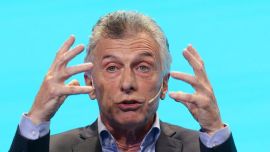If my last column written for Independence Day (July 9) before interruption to cover winter holiday staff shortages and entitled ‘From Gooseman to Batgirl?’ centred on a brand-new Economy minister, the subject upon its return today is likewise a brand-new minister – even if inflated to super-minister with the annexation of the Agriculture and Productive Development Ministries.
That old Taoist saying: “Those who speak don’t know, those who know don’t speak” could now be reworded 26 centuries later to read: “Those who have been Speakers (in Congress) don’t know …” – in reference to the new Economy Minister Sergio Massa’s lack of professional expertise in what looks more like the “dismal science” than ever in the light (or dark) of the gloomy economic outlook.
This move from Congress Speaker to Economy Minister has a precedent, reminding me (not that I can make any claim to be the first here) of the hyperinflationary autumn of 1989 when Juan Carlos Pugliese was switched from the Chamber of Deputies helm to succeed Austral Plan mastermind Juan Sourrouille – the coincidences do not end here because if Pugliese was replaced as Speaker by Leopoldo Moreau, Massa now relinquishes Congress to the charge of Moreau’s daughter Cecilia.
Not the most propitious omen for Massa because Pugliese lasted just 45 days, during which time he saw inflation spiral from 34.4 percent that April to 114.4 percent in May with the fiscal deficit running at 14.5 percent of gross domestic product – at least the new minister has the consolation of being unlikely to do worse. Hard to imagine the ultra-pragmatic Massa echoing Pugliese’s sentimental appeal to businessmen: “I spoke to you out of my heart and you answered me with your pockets.”
If Massa’s immediate past as Congress Speaker evokes Pugliese, his tag as “super-minister” recalls a far more formidable heavyweight – namely, Domingo Cavallo (economic czar for 2,248 days and not 45). Cavallo’s full title as Minister of Economy and Public Works and Services already places him in a different league to Massa, whose annexation of the Agriculture and Productive Development Ministries does not extend to Public Works, whereas Cavallo had full control of both farming and industry (with Felipe Solá as his efficient and compliant Agriculture secretary).
But Cavallo’s main supremacy lay in a command of both fiscal and monetary policy denied Massa with the continuity of Central Bank Governor Miguel Pesce while AFIP tax bureau has turned more Kirchnerite with Carlos Castegneto replacing Mercedes Marcó del Pont (sidelined to the long-term limbo of Strategic Planning). In contrast, Cavallo had such a perfect soulmate at the Central Bank in Roque Fernández that when an untimely gall bladder operation temporarily removed the super-minister from the scene at a crucial stage in drafting the convertibility plan in 1991, he could entrust the finishing touches to Fernández with results entirely to his satisfaction. Revenue was in the extremely capable hands of Carlos Tacchi, the scourge of tax evaders.
Massa does have Customs fully in his orbit with Guillermo Michel while this week he has finally managed to place an Energy Secretary to his taste in Flavia Royón (from the team of Salta Governor Gustavo Sáenz, his 2015 presidential running-mate) even if Vice-President Cristina Fernández de Kirchner retains her footholds in this highly strategic area. But Cavallo’s grip on both spheres was even more complete.
The biggest contrast between Cavallo and Massa, however, probably lies in where the buck stops. Carlos Menem did not even have a vice-president for all but the first months of convertibility with Eduardo Duhalde sent off to govern Buenos Aires Province in late 1991 while Massa’s rise has relegated President Alberto Fernández to a distant third in the ruling troika where Cristina Fernández de Kirchner retains full veto powers even when abstaining from calling the shots.
While austerity policies might meet with Kirchnerite tolerance at this distance from the election if Massa can bring in the dollars to replenish Central Bank reserves (dwindling faster than ever so far this month), there is no blank cheque. At the current rate of reserves depletion, the moment of truth for a major devaluation might come before the month is out – perhaps the first real test for the vice-presidential window of tolerance. If she countenanced a maxi-devaluation in early 2014, circumstances were very different then. Monthly inflation was running at a couple percent, not several percent as now, and Central Bank reserves were US$17 billion at the close of 2013 – perhaps most importantly, Argentina then had a hands-on president in the person of herself. If the 2014 devaluation immediately took monthly inflation up from two to five percent, the impact now would surely be double digits – enough to give anybody pause but the current exchange rate gap is a non-starter for coaxing dollars. That 2014 devaluation was preceded by a carrot very similar to the “soy dollar” recently added to the plethora of exchange rates – a bond offering a 3.65 percent interest rate surcharge in return for export dollars cashed in the vain hope of netting US$2 billion as against US$5 billion now.
But all these strategies of accelerating export dollar inflow or advancing taxation stumble on the fallacy of working with finite quantities – bread for today and famine tomorrow, as they say locally.






















Comments